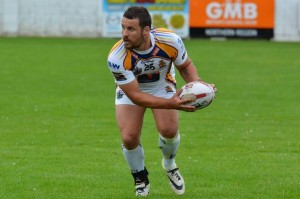Roseanne Seymour, the wife of Whitehaven Rugby League Player Brett has spoken about her husband’s attempt to take his own life in this weeks Sunday Mirror story with Kim Willis in the Easter Sunday edition
As I entered the hospital ward and saw my husband covered in blood and bandages, sobbing, I realised I had no idea what he had been going through.
Just a few hours earlier, I’d kissed him goodnight and left him to watch a rugby match on TV. He told me he loved me and would be up to bed soon. Three hours later he tried to drive our car off a bridge.
It was March 3rd 2013 and as far as I was aware, we were happy. Brett, now 30, and I had been together for 12 years, after meeting in our native Australia.
We’d travelled the world, following Brett’s career as a rugby player. He was playing for Hull FC and we had a daughter, Monroe, who was 10 months old.
I was fast asleep when a police officer banged on our door late at night. He told me my husband was on his way to hospital. Confused, I assured him Brett was watching TV in the house. The police officer explained that, sadly, Brett had been in a serious incident and had a suspected spinal injury. They rushed me to Hull General Hospital.
The most distressing thing was seeing Brett crying so uncontrollably. I’d never seen him so upset. He kept saying he’d wanted to die.
It was only then I realised he’d crashed his car on purpose. I didn’t know if he would recover or if he even wanted to be here and it was the scariest feeling of my life.
How could I not know?
I went over the events of the last few weeks. How could my husband be suicidal while I thought everything was great? Brett had been a rugby player since being signed to Australia’s biggest team, the Brisbane Broncos, as a teenager.
As a professional athlete, he was determined to be strong and capable, on and off the pitch. That day he’d come home saying he hadn’t performed well. He was just in a bad mood, I had no inkling it was anything more.
Now I know that’s because he was hiding the truth, but there was no flashing neon sign saying “Help me!”. He didn’t want me to detect the seriousness of what he was going through, and I didn’t.
That same afternoon he seemed to cheer up as we walked our dogs in the park, then he played with Monroe while I made dinner. Now he was in hospital, his arm and face covered in cuts where the windscreen had smashed all over him. I hugged him and told him I loved him.
He’d drunk a bottle of wine, then taken a mouthful of sleeping tablets. The concoction hadn’t helped his fragile mind. He’d grabbed the car keys and fled, thinking his only option was to drive our BMW off the Humber Bridge.
The sleeping pills had made him groggy and, thankfully, he’d passed out just before the bridge. His car rolled several times and crashed into two parked cars. The roof caved in, every panel was battered. How he had come out of it with no more than fragments of glass in his arm, I don’t know. Luckily he hadn’t hurt anyone else.
Brett spent 26 days in a rehabilitation clinic for professional athletes, Sporting Chance. He also started therapy. It was only then he learned how to talk about his feelings.
He was given anti-depressants and started to process what he’d been through. He gave up drinking and left Hull FC on good terms, lining up to play for Whitehaven, Cumbria, in the next season.
The tough rugby player who appeared not to have anything wrong has been replaced by a man just as good at rugby, but better at talking.
Brett says when he crashed that day, he hoped to die. When he woke up, he was relieved he hadn’t, but he was also scared that he’d reached that point.
He’d spent months spiralling into a dark place, carrying the burden of hoping to perform at an optimum standard despite a knee injury. At night he’d lie awake, convincing himself he was worthless. He kept the feelings bottled up, not sharing them with me, his team, or his coach.
I call depression the silent killer. If you break your leg, you fix it. But when your mind is broken, you ignore it – sometimes until it’s too late.
The irony is Brett thought it was showing a weakness to talk about his emotions. Now we realise the real weakness was in bottling it up until it was almost too late.
Men struggle to talk about depression and anxiety
● According to Mentalhealth.org.uk , about a quarter of the population will experience some kind of mental health problem in the course of a year, with mixed anxiety and depression the most common mental disorder in Britain.
● British men are three times more likely to die by suicide than British women.
● Women are more likely to be treated for a mental health problem than men. This could be because women are more likely to report and talk about symptoms of common mental health problems.
● Suicide remains the most common cause of death in men under the age of 35.
● The Campaign Against Living Miserably (CALM) is a nationwide charity that’s been set up to help men seek help before suicide is an option.
● CALM’s ethos is: “We believe if men felt able to ask for and find help when they need it then hundreds of male suicides could be prevented. We believe there is a cultural barrier preventing men from seeking help as they are expected to be in control at all times, and failure to be seen as such equates to weakness and loss of masculinity.”
● CALM’s website is thecalmzone.net . Its helpline is open 5pm to midnight, 365 days a year. If you need help or guidance, call 0800 58 58 58.
Brett is one of many rugby players who attempted or succeeded suicide, so the Rugby League set up State Of Mind to help players with their mental health and engaged Sporting Chance Clinic to help players to become mentally fitter. Visit Stateofmindrugby.com for more information.

